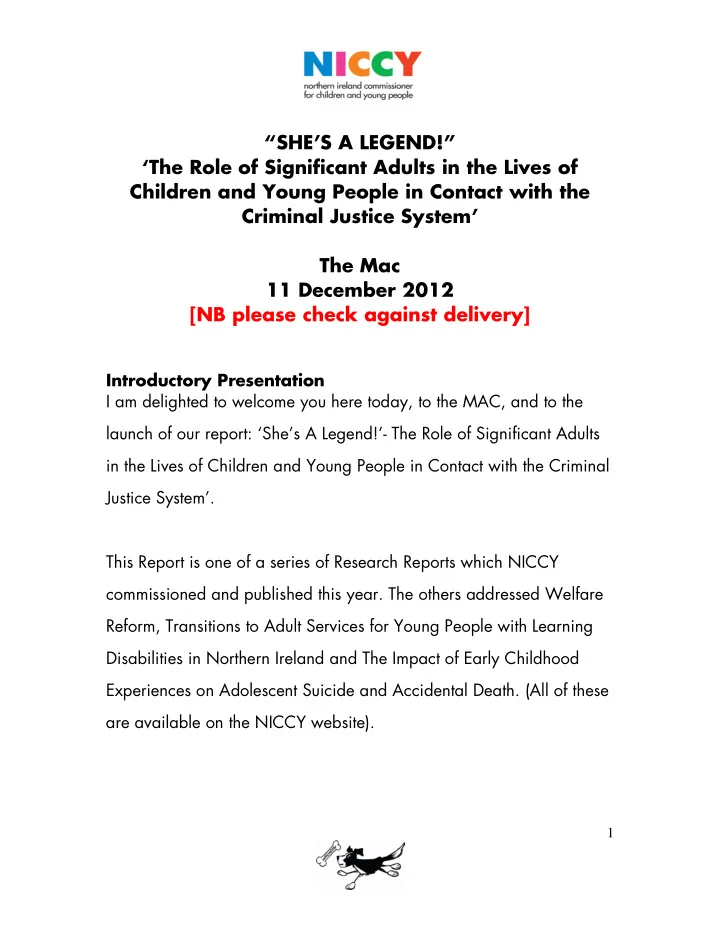

“SHE’S A LEGEND!” ‘The Role of Significant Adults in the Lives of Children and Young People in Contact with the Criminal Justice System’ The Mac 11 December 2012 [NB please check against delivery] Introductory Presentation I am delighted to welcome you here today, to the MAC, and to the launch of our report: ‘She’s A Legend!’- The Role of Significant Adults in the Lives of Children and Young People in Contact with the Criminal Justice System’. This Report is one of a series of Research Reports which NICCY commissioned and published this year. The others addressed Welfare Reform, Transitions to Adult Services for Young People with Learning Disabilities in Northern Ireland and The Impact of Early Childhood Experiences on Adolescent Suicide and Accidental Death. (All of these are available on the NICCY website). 1
The Office commissioned research into these various issues, as part of NICCY’s remit to highlight particular issues which impact on children’s rights and best interests. The primary aim of the Office of the Northern Ireland Commissioner for Children and Young People, as set out in legislation, is ‘to promote and safeguard the rights and best interests of children and young people’. This includes reviewing legislation, policies and services for children, advising on children’s rights and best interests, and – where necessary – challenging Government to deliver more effectively for children and young people. The work of the Office is guided by the United Nations Convention on the Rights of the Child, or the UNCRC as it is often referred to. The UNCRC is a framework setting out minimum standards for children’s rights across all areas of their lives. Such rights include the right to life, development, education and the right to be heard. There are also specific rights which seek to protect and provide for children and young people who may be in conflict with the law. The UK Government ratified the UNCRC in 1991 and the UN Committee on the Rights of the Child monitors governments’ implementation of the 2
Convention. The UK Government, including Northern Ireland, is due to report to the Committee in 2014. It is important to emphasize that the vision of the Convention is not simply that Government meets minimum children’s rights standards. Rather, it is that the full implementation of the UNCRC will enable children and young people to live in families, communities and societies where they can flourish and where their individual dignity and physical integrity is safeguarded and respected. The experiences of children and young people who come into contact with the criminal justice system in Northern Ireland is a key focus of NICCY’s work. Since it was established in 2003, the Office has provided advice and highlighted issues of concern to government, in relation to a wide range of youth justice matters. These have included, just to mention a few; aspects of policing, the use of tasers, the detention of u18s in Hydebank Wood and DNA and fingerprint retention. In undertaking work on youth justice issues, NICCY is acutely aware that many children and young people who come into contact with the criminal justice system, are extremely vulnerable. They have often been 3
affected by an array of issues, such as family breakdown, poverty, drugs or violence. They may be care-experienced or have been or remain on the child protection register. And, they continue to encounter many challenges in their lives. These often complex and difficult issues have been referenced in some detail in a range of government, inspection and research publications. Given the nature of the circumstances, in which some young people may find themselves, NICCY was interested to know more about the type of positive relationships in which they might be engaged. In particular, our interest was in the kind of positive relationships young people might have with ‘significant adults’, that is, adults, other than family members or carers, who played an important and supportive role in their lives. We wanted to find out more about how such relationships were initiated, why they were beneficial to young people and what made them successful. We were particularly eager to hear from young people themselves, to learn how they believed relationships with significant adults had influenced their lives and helped them to deal with specific issues. We were also very interested to hear about the experiences of ‘significant adults’ themselves, in order to better 4
understand the nature of their role, the kind of difficulties facing young people and the type of support and services they felt were required to support their work. And so, we commissioned a team of researchers to undertake explore these issues in some detail. We will hear from them shortly when they present the Report’s findings and recommendations. However, before that, I am delighted now to introduce you to three of the ‘Significant Adults’, two of whom took part in the research. They have kindly agreed to describe their work and to share some of their insights and experiences with us today. I would particularly like to thank Lorraine Thompson for coming along today from ‘Include Youth’. She has stepped in at the last minute today, for Mat Crozier, who is unable to be here. So I would like to welcome Ronan McGinley, Service Manager at Opportunity Youth, Billy Clarke, Senior Practitioner at NIACRO and Lorraine Thompson, Training and Development Co-ordinator at ‘Include Youth’. 5
Recommend
More recommend